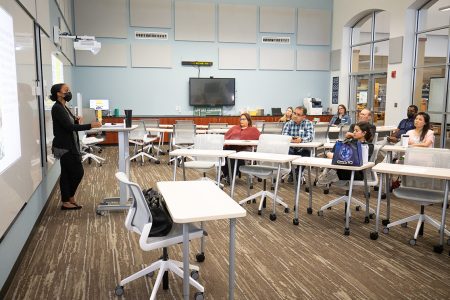
Joel Solis/The Collegian
OLLA MOKHTAR
campus editor
olla.mokhtar@my.tccd.edu
SE Campus hosted an event Sept. 28 to recognize and commemorate the progression of voting and other rights for Black women before and after the 19th Amendment.
TCC is one of 25 libraries and institutions in the U.S. to get the “Let’s Talk About It” women’s suffrage grant. This allowed the SE Judith J. Carrier Library to do book discussions for five different books in the form of a program sponsored by the American Library Association and the National Endowment for the Humanities.
“Vanguard: How Black Women Broke Barriers, Won the Vote, and Insisted on Equality for All” by Martha S. Jones is the last of the books that the program addressed. It was led by assistant director of library services Tracy Robinson and public services librarian Anna Hithersay as well as various SE faculty from the history, government and English departments.
The event started with a presentation by history instructor Stephanie Hawkins about the importance of women’s history and why people don’t focus more on it. Afterward, a drawing gave the audience an opportunity to win a free book from the series, including Vanguard.
Robinson was one of the event’s organizers who believed it was important for students to learn about the history behind the book.
“I hope they learn more about the long history of struggling for equal rights and equal representation,” Robinson said. “And it’s still not over. The book covers all the way up to the 2020 election and the work that [Georgia gubernatorial candidate] Stacey Abrams was doing to get people to vote and to make sure that they had the right to vote.”
Robinson further explained how the fight for equal rights and representation is still ongoing.
“There are laws put in place to limit voting,” Robinson said. “You see this with the coronavirus when people are trying to do mail-in voting and when districts are being changed and redrawn. They’re trying to change the makeup of the people who are voting.”
For non-Black people, Robinson recognized the importance of them listening to the presentation.
“The women who are given voices in this book are so very important,” Robinson said. “They have done a lot for this country, and I think that they can be a role model for anybody.”
Hawkins said women are not recognized as much as they need to be in the country.
“I think a lot of people only know basic American history and have no idea how much women have contributed to the creation of this country,” Hawkins said.
For Hawkins, her presentation had a specific purpose to the public as well as some personal relations to it as a Black woman.
“The most important thing was to put a spotlight on Black women who have paved the way for voting rights in this country,” she said. “I related to the fact that every group needs to have their own space where they can be themselves without having to deal with invalidation or their experiences being disregarded.”
SE student Miranda Brown also related her experience with invalidation and how it affected her as well.
“I related to being silenced and wanting my rights to be legally acknowledged,” Brown said. “Everyone has an agenda. As soon as white women were denied voting rights over black men, they spouted the same rhetoric that was supposed to keep power out of women’s hands.”
As a person that is not from the Black community, associate professor of english Monica Marchi defines attending these events as a learning opportunity.
“We do not live in a bubble and learning about history and other people’s experiences and struggles is essential for our personal growth,” Marchi said. “History offers valuable lessons that, unfortunately, sometimes we forget to heed. Constantly refreshing our knowledge, learning for the sake of learning and questioning the status quo should be what drives us to become better citizens and human beings.”

